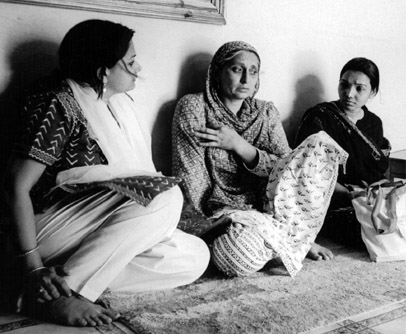Dec 20, 2025
Dec 20, 2025

The very worst situations bring out the very best in some of us: that is what the Gujarat pogrom of 2002 did to Latifabano Mohammad Yusuf Getali, born in 1962. From the uneventful life of a Muslim housewife with four children to a relief and peace activist, she has walked a long mile. Braving the wrath of her conservative community, Latifabano has helped hundreds of Muslim women in the state gain access to relief and legal assistance.
The largely uneventful life that Latifabano had expected to lead was severely challenged during the Gujarat carnage following the riots in 2002. And she was at the riot epicenter: Godhra.
The 2002 Gujarat communal riots, which much of the media called a "State-sponsored genocide of the minority community", affected over 100,000 families. Thousands lost loved ones, were displaced, and rebuilt their lives from scratch. The conditions at the refugee camps were abysmal.
The atmosphere in the crowded relief camps, where Latifabano became a relief worker, was of incessant terror and apprehension. Several women, including Latifabano, became relief camp volunteers, looking after riot victims, including children, performing linking and managerial roles. Her performance as a camp volunteer was highly appreciated; her skill in assisting and supporting women was given due cognizance, despite so many others doing the same work. Activists from women's groups and human rights organizations that visited the camps encouraged her to continue the good work even after the camps were closed and the work ostensibly over.
Latifabano's work also involved disseminating information about various legal and human rights bodies and individuals to the local families who had survived the riots.
When the relief camps eventually shut down, Latifabano started her own organization: the Al-Fazal Educational and Charitable Trust. Al-Fazal has been supporting underprivileged women, building their capabilities through information dissemination, and working tirelessly for peace between the majority Hindu and minority Muslim communities.
As Latifabano's organization was the first Muslim women's organization in Godhra, she faced the considerable wrath of the conservative Muslim community. But she continued undeterred, and the community gradually turned supportive. In the past couple of years, she has helped many families gain access to relief and legal assistance-in essence, bridging the gap between those working to help the affected and the victims themselves.
Her work has also enabled the starting of a dialogue between Hindu and Muslim women in Godhra, where seeking peace, under the circumstances, seemed like asking for a miracle. Latifabano's work has also inspired a number of women into examining the rest of their lives with a positive outlook.
Although statistics can be misleading in work of this kind, the success of this middleclass Muslim housewife can be gauged from the bean counter: 82 women who Latifabano helped avail of government schemes are now independent income generators; 80 women have been taught basic skills like knitting, stitching, and embroidery, and are economically self-sufficient; 100 women were educated under her adult education scheme and are now able to read and write; and 93 girls and boys are studying in the first grade in English-medium schools.
Latifabano's work has inspired a number of women into looking at the rest of their lives with positive a focus.
As one of that breed that has challenged the stereotype of Muslim women in India, Latifabano has shown immense courage and conviction in pursuing the cause of Muslim women and children within and outside her community.
12-Feb-2006
More by : Subhash Arora